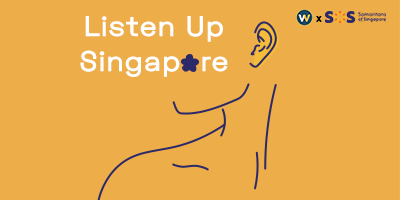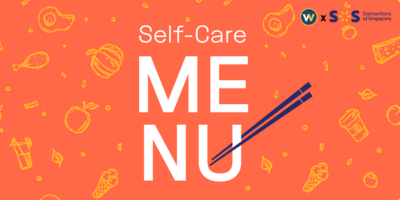Published 20th October 2023
This article was written as part of a social media campaign in collaboration with Samaritans of Singapore Limited.
* The following article contains information that discusses sensitive issues like suicide, self-harm and suicidal thoughts. Please do not use this article as a “guide” on how to deal with mental health and issues. If you have suicidal thoughts or behaviours, please contact: Samaritans of Singapore’s 24-hour Hotline: 1767 or reach out through their 24-hour CareText: 9151 1767 (via WhatsApp). To protect their identities, pseudonyms are used in this article.
In 2022, the Straits Times reported a national study that had discovered that one-third of Singaporean youths have internalised mental health symptoms, such as sadness, anxiety, and loneliness.
While it has become a more prevalent conversation in recent years, those who are struggling may still feel stigmatised and unwilling to seek help. In an effort to create a more open conversation, university students Jasmine and Gladys are sharing their personal experiences with mental health and their thoughts of suicide. Please note that mental health struggles are varied and the way one person copes might not be the way you do.
Jasmine
2nd year university student Jasmine (not her real name) has the ability to look convincingly appear as if like she enjoys life.
She claims that while some days she does indeed enjoy life, other days she struggles to even get out of bed to brush her teeth. “I’ve come a long way, at the ages of 15 to 16, it was a test every single day trying to get out of bed and go to school, most days I just gave up.”
Jasmine remembers grappling with suicidal thoughts at just 15. “At 15 years old, you escape to the internet a lot and you read things, for me it was Tumblr. I realised I related to these strangers. I didn’t want to live. After I got diagnosed with depression, it seemed that these suicidal thoughts only got worse.” She recalls her parents being worried about her. She rarely attended classes and teachers would call up to check on her. “It was strange, even while fighting these mental battles, I was still worried about having to retain and being a step behind all my classmates and friends,” she says. “I felt so helpless.”
Aiming to block out the noise, Jasmine decided she would throw herself into her studies and block out everything else. She managed to move on to Secondary 4 with the rest of her classmates, but she still felt uneasy. “Often I felt out of control, I couldn’t control my emotions, I was anxious and sad, irritable. Some days I felt numb. My parents didn’t know what to do. I had the thought of…self-harming to gain back that control.” She tells me she tried it. “I mean I’m not proud of it, I was only 16 at the time.”
“I started seeing a therapist, I actually told my parents I wanted to, I didn’t tell them I had cut myself.” Through seeking help, she says she has seen an improvement, although things are still tough. “I graduated secondary school, entered the polytechnic of my choice. I would tell my 16-year-old-self that I am so proud of her.”
“I know my depression will probably be part of my life forever, I’m okay with that,” she says. She wouldn’t change anything about her journey. “I would just tell my past self to keep hanging on, it’s super cliche, but it does get easier,” she says. “I’m still fighting everyday, but I am so happy that I am here today. And that I made that decision to keep fighting.”
Sitting in front of me today, a confident 22-year-old woman, she still struggles with her depression but finds ways to support herself. “I look to my friends a lot, I’m grateful they listen to me and support me. I’m still seeing a therapist, it has been so important in my recovery.” Although no longer having thoughts of self harm, whenever she does find herself falling into a space of having suicidal thoughts, she shares that she tries to practise mindfulness breathing and tries to shift her focus to something else, whether that be playing a video game or watching a TV show. “Sometimes even those techniques don't work, but everyday I’m trying.”
She tells me she looks forward to many things in the future. “I would love to see my sister get married,” she jokes. “I have many things I want to accomplish, I want to get my degree and I want to travel the world.”
She says she does get anxious thinking about all the things she can’t control in the future.
She recalls how things got off to an auspicious start at the start of 2020. She felt like she had made good progress with her mental health. Then Covid-19 happened and Singapore went into lockdown. “I mean that period of time was tough for everyone, I went into an extremely depressive state but it definitely made me realise the unpredictability of things. So I may relapse, but then I would just work towards being better again, I believe in my future self," she says. “She’s hopefully smarter too,” she jokes.
Jasmine notes that her experience with depression and suicidal thoughts may be very different to another, acknowledging her privilege in her recovery. “But I do hope that sharing my story can help in whatever small way in someone else’s journey.”
Gladys
Gladys remembers visiting her school counsellor and experiencing anxiety as early as Primary 1, recalling that she would cry a lot. “I’ve gone through a whole lot of things. I was diagnosed with depression when I was in Primary 2 or 3, which escalated into obsessive-compulsive disorder (OCD) when I was in Primary 6 during my PSLE period. I remember crying every single day. It wasn’t a fun time, it wasn’t very healthy” she says.
Acknowledging the level of help she needed, Gladys moved from school counsellors to professional psychologists and counsellors, after receiving her formal diagnosis, she started going to therapy. Now living with depression and OCD, Gladys describes how her OCD manifested into anorexia. “With OCD, there’s a natural need to gain control over things, that control manifested itself in controlling my diet.” Gladys tells me that she believes anorexia is more of a mental struggle than a physical one, describing how an eating disorder can make a person see eating “as an enemy”. She eventually had to be hospitalised.
“You’re physically unfit but at the same time you are also mentally ill, they’ll force-feed you at the hospital, they need you to be alive before they can treat your mind. You have to overcome that mental part before you reach the healthy point in your relationship with food,” she says.
She recalls going in and out of hospital due to relapses. She harks back to the monitors beating every single minute due to her low heart rate. “There were a lot of days where I was suicidal, you were just strapped to your bed, you’re not allowed to walk, get off the bed, I couldn’t even go to the toilet by myself,” she says.
Feeling like she had her basic rights stripped away, Gladys questioned the point of living. “There were many times I contemplated, why not I just, whenever they gave me the nasogastric tube (for food), I would just not swallow and choke myself to death or run away from the hospital right now,” she says. “The thoughts were very negative and toxic…just having those thoughts, that was scary enough,” she acknowledges.
She brings up the medical team and her family as her 2 main pillars of support, highlighting that she relied on herself the most for emotional support. “I wish I had more emotional support then. The emotional support was really tough, the mental aspect was the toughest part to overcome,” she says.
Gladys lost a lot of friends being in hospital, bringing up her Secondary 1 and 2 friends who she thought would pull through with her. “It’s kind of sad looking back… all my Secondary 1 and 2 friends just drifted away because I was in hospital. I kind of expected that they would pull through with me. But it didn’t happen… turning back time, sometimes you need that respite from all this, you just need that sense of normalcy from your friends.”
“Will there ever be a day where I can actually be mentally well?” Gladys would ask herself this during her recovery period. Citing that she found the light at the end of the tunnel hard to see, she says that she would tell the doctors during doctor appointments: "I don’t want to recover anymore. Can you just leave me like that? Recovery is so difficult."
“Mental monsters are very scary because they can really control what you’re doing and sometimes you’re just left there, if no one is there to support you, you can spiral even more,” she adds. This was one of the hardest parts for Gladys, trying to see progress in her own recovery journey. “At that point of time, it really felt impossible to step out of it, of course it is possible to recover but even when I was almost recovered it even made me question if I’ll ever be fully recovered in a sense where I’ll finally achieve freedom… and my mental health will be healthy,” she says.
A different version of herself today, Gladys thanks her past self for not giving up on recovery, for pulling through and coming out better. “I wouldn’t say I want to go through this, but this journey taught me a lot and made me who I am today, I wouldn't want to go through it again but I wouldn't turn back time and say no I don’t go through it,” she says.
She missed out on 13 years of her life already, she says she’s prioritising living life more than anything else. “I’ve missed out so much on life…nothing is more valuable than being able to do what you like to do, don’t let anything discount that,” she says.
And she’s proud of the journey she’s made to get to where she is not. “I am no longer in that same head space, on the hospital bed thinking those thoughts, no longer restricted to my bed. I can eat whatever I want now - without feeling much guilt, although there are some days where I experience relapses, but I am proud of the fact that on most days I can control it and enjoy what a normal university student can do.”
Now off her medication, Gladys is taking conscious effort and time to prioritise her self-care needs. Speaking to her future self, Gladys says: “Hopefully you are mentally strong and you’re less affected by these intrusive thoughts that you have. And that you’re more confident in yourself and your insecurities affect you less.”
“Honestly, I don’t know,” she says when asked about what she’s looking forward to in the future. “I do have a passion for talking, precisely why I’m doing this interview,” she laughs. “Hopefully I can do a job where it blends my interest in speaking to people and also earning me a stable income, now I’ll just focus on my university degree and see what happens,” she adds. ∎
If you are experiencing any suicidal thoughts or behaviours and require support, you are not alone, contact:
24-hour Hotline: 1767
24-hour CareText: 9151 1767 (via WhatsApp)



 Wee Kim Wee School
Wee Kim Wee School